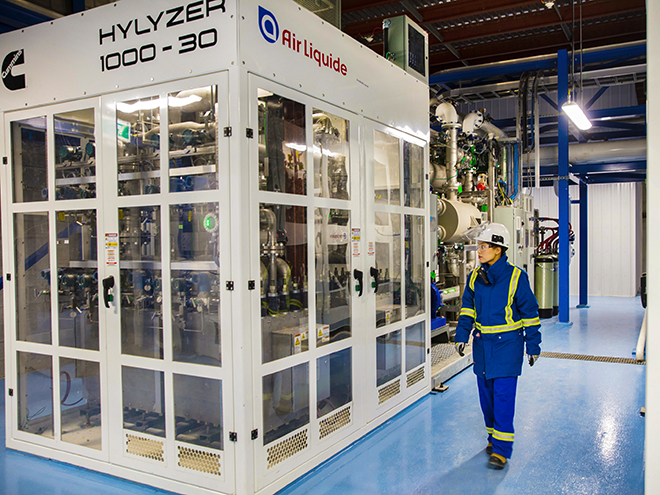
A hydrogen production tax credit would support the uptake of technology such as electrolyzers needed to make the low-carbon fuel. |
One of the most consequential U.S. hydrogen policies remains mired in Democrats' bid to get their Build Back Better agenda back on track as the Senate reconvenes.
A proposed hydrogen production tax credit, or PTC, was among the casualties of infighting over the roughly $2 billion climate and social spending bill. The friction reached a sudden pitch Dec. 19, 2021, when Sen. Joe Manchin, D-W.Va., announced he could not support the House-passed legislation despite ongoing negotiations.
The announcement upended months of lobbying by hydrogen stakeholders to include tax incentives for low-carbon hydrogen production. That policy has long been cited as one of the most critical for spurring clean hydrogen uptake and driving down its substantial cost premium over other fuels.
"It is among the most essential actions the U.S. can and should take," said Julio Friedmann, a senior research scholar and carbon management expert at Columbia University's Center on Global Energy Policy. "A hydrogen production tax credit is essential if the private sector is going to invest substantially and over a long period."
Low-carbon hydrogen is core to decarbonization strategies at many gas utility operators, which are fending off a growing building electrification movement. Electric power utilities have also pushed the PTC as they seek to use hydrogen as a means of storing renewable power and decarbonizing gas-fired power plants.
Hydrogen PTC not dead yet
Despite the apparent finality of Manchin's statement, Senate Majority Leader Chuck Schumer, D-N.Y., has vowed to continue working on the bill until it passes. Sen. Ben Cardin, D-Md., recently told "Fox News Sunday" that Democrats would seek to make the bill as comprehensive as possible but acknowledged the party was considering a scaled-back package or passing some provisions as stand-alone legislation.
Research consultancy Energy Aspects sees little chance that anything close to the most recent version of Build Back Better becomes law. Democrats will likely have to eliminate or modify provisions that are not fully funded over 10 years, according to Peter Rosenthal, head of North America power and gas at Energy Aspects. Additionally, Democrats could push provisions that Manchin would support, which likely include tax credits for coal- and gas-fired power generators to convert to hydrogen and incentives for developing clean energy projects on brownfield sites, Rosenthal added.
Hydrogen has support on both sides of the aisle, Northwest Natural Holding Co. President and CEO David Anderson said during a Nov. 5 conference call. Yet analysts said it is difficult to tell whether a stand-alone hydrogen PTC bill could pass.
"Getting anything done in Washington right now is extremely difficult," Rosenthal said.
Failure could throttle utilities' plans
The House-passed bill included a PTC of $3 per kilogram for hydrogen production with near-zero emissions, with smaller incentives for higher-emissions output. The formula would advantage green hydrogen, which is produced using zero-carbon electric power or heat, chiefly through electrolysis. It would also support blue hydrogen production from natural gas capable of achieving high carbon capture rates.
The PTC is perhaps less crucial to utilities because some can invest in hydrogen projects through their rate base, but the credit would accelerate energy sector adoption, Rosenthal said. Recent commentary from utility executives supports that view.
Xcel Energy Inc. President, CEO and Chairman Robert Frenzel said the PTC would accelerate the time frame for incorporating hydrogen into the company's power generation and gas distribution operations at an economic cost to customers. NextEra Energy Inc. CFO Rebecca Kujawa said a $3/kg credit represented a "terrific opportunity" to spur near-term growth in hydrogen uptake. The PTC would "jumpstart the industry," according to South Jersey Industries Inc. President and CEO Mike Renna.
More regulators might be willing to support rate basing hydrogen investments if the U.S. Energy Department achieved its goal of driving down low-carbon hydrogen prices by roughly 80% to $1 per kilogram by 2030.
Cost, competition, climate targets
While the cost of electrolyzers is expected to drop as the installed base grows, the PTC would drive uptake and hasten the learning curve, according to Roman Kramarchuk, head of energy scenarios, policy and technology analytics at S&P Global Platts. If guaranteed over an extended period, the credit would offer greater certainty around project returns, Kramarchuk added.
If the PTC does not pass, something like a renewable portfolio standard for hydrogen or carbon pricing present other options to drive demand, Kramarchuk said. However, tax credits have historically been more politically palatable than carbon pricing, Kramarchuk noted.
The bipartisan infrastructure bill included $9.5 billion in support for hydrogen, including $8 billion to establish regional hydrogen hubs. The DOE is also investing in bankable hydrogen projects and supporting research and development.
Friedmann called the hydrogen hub investment "a great opening ante" but said far greater support is necessary in light of emerging global competition in the hydrogen space and the fuel's ability to decarbonize virtually every sector of the economy.
"Compare this with the hundreds of billions of dollars that are going to be spent in Europe, and we will not be competitive," Friedmann said. "Compare this with the growth in industrial emissions in the United States and we will not hit our climate goals. The arithmetic here is very simple."
S&P Global Platts and S&P Global Market Intelligence are owned by S&P Global Inc.



